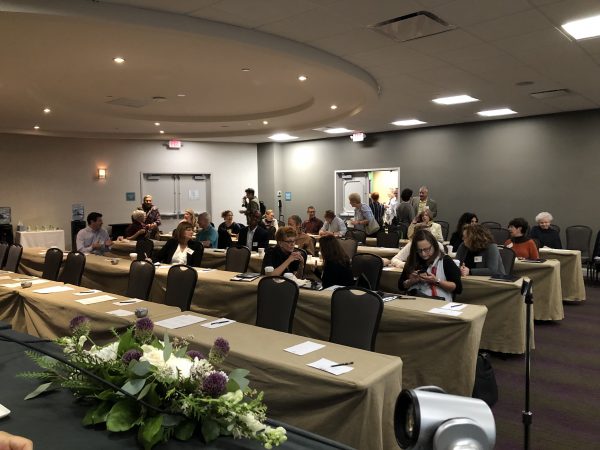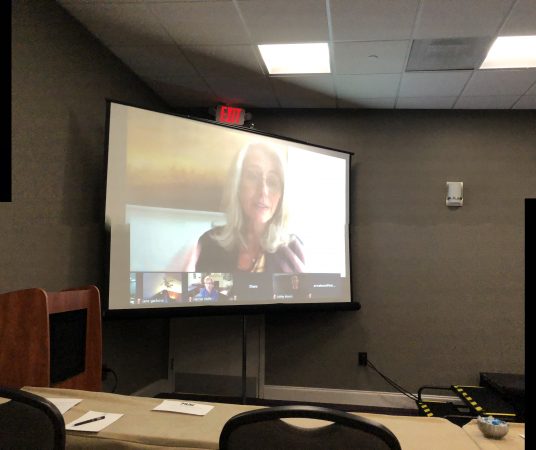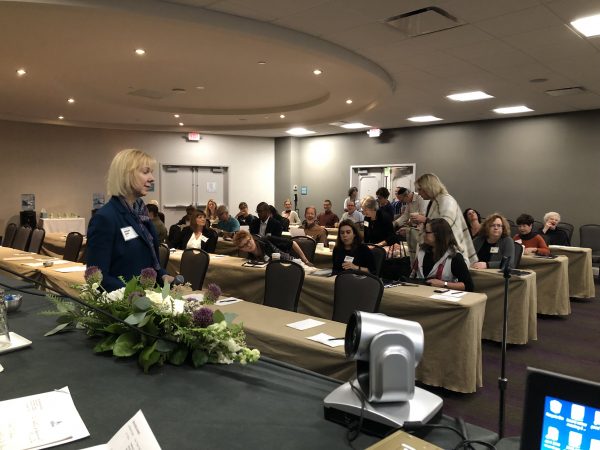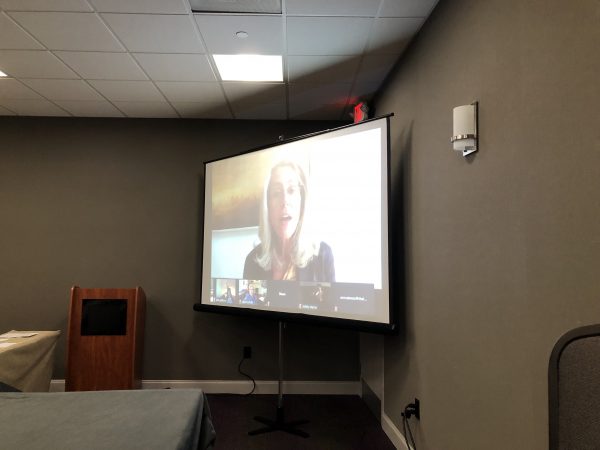Jill Savege Scharff, October 5, 2019.

I am here at the International Psychotherapy Institute weekend conference Technology and Ethics in Treatment and Training: Best Practices. I am sitting in the audience of 60 people at a hotel conference room while the guest speaker talks with us via proZoom. It is now Saturday October 5, 2019. There on a large screen is Alessandra Lemma, Fellow of the British Psychoanalytical Society and Consultant-Clinical Psychologist at the Anna Freud Centre for Childrenand Families, Honorary Professor of Psychological Therapies at the School of Health and Human Sciences at Essex University, and Visiting Professor, Psychoanalysis Unit, University College, London. She is presenting on the impact of Internet pornography on development. We can see and hear Alessandra. She can see us in general and can hear each one in particular who comes to the microphone and web camera to speak to her. When she moves away or looks down we may miss the end of a word, and she may have to ask us to repeat a word, but by and large we can follow her talk. Some of us would rather interact with her in person, but she lives in London and cannot spare the time to travel here for a weekend conference or for one lecture. This way we are deprived of her actual physical presence but not of her humanity. We have the gift of her presentation, and we get to interact with her and her ideas. And we get to know her as a presenter beyond our experience of her as a writer from reading her book The Digital Age on the Couch. Technology isn’t perfect but it gives access to her knowledge. So what am I taking away from her talk?
 I learn that Internet pornography, which obviously fundamentally interferes with sexual desire and development in adolescence, is now leading to sexual dysfunction in young people of the digital generation. Why is this happening in this age of enlightenment about sexuality? They spend their life online and pornography is not only regularly available but also jumps out at them. Ready access to pornography stimulates desire and leads to the delivery of instantaneous satisfaction. There is no need of delay. Under normal circumstances desire experiences a delay before there is the delivery of satisfaction. But in internet pornography there is no need of a journey towards gratification all because it is already there. This collapse of time and space incurs a stultification of psychic development. Psychic development requires delay of gratification, which leads to psychic movement across time, the unconscious mind at work developing its representations of desire and its gratifying objects of satisfaction. Furthermore, pornographic images do not only receive existing fantasies but also project other people’s fantasies violently into the viewer’s body and mind where they take over, creating a “not-me” experience and foreshortening the consolidation of sexual identity.
I learn that Internet pornography, which obviously fundamentally interferes with sexual desire and development in adolescence, is now leading to sexual dysfunction in young people of the digital generation. Why is this happening in this age of enlightenment about sexuality? They spend their life online and pornography is not only regularly available but also jumps out at them. Ready access to pornography stimulates desire and leads to the delivery of instantaneous satisfaction. There is no need of delay. Under normal circumstances desire experiences a delay before there is the delivery of satisfaction. But in internet pornography there is no need of a journey towards gratification all because it is already there. This collapse of time and space incurs a stultification of psychic development. Psychic development requires delay of gratification, which leads to psychic movement across time, the unconscious mind at work developing its representations of desire and its gratifying objects of satisfaction. Furthermore, pornographic images do not only receive existing fantasies but also project other people’s fantasies violently into the viewer’s body and mind where they take over, creating a “not-me” experience and foreshortening the consolidation of sexual identity.
What makes an adolescent vulnerable to exploitation by pornographic images on the Internet? Alessandra suggests that we need to look backwards to the kind of infancy when an endless sensory, erotic experience occurs without the cognitive resources to make sense of it. Then it falls to the mother to reflect the sexuality of the infant and give the infant time to make sense of it. She delays gratification, which gives the body time to organize its response and fulfill its role as the link between desire and satisfaction, self and other. She develops cycles of frustration and satisfaction that shape the infant’s rhythms, which later underpin the expression of desire in later stages of development. When she fails to do this, the child develops an incoherent mental representation of the body.

Then in adolescence there is a desperate search to find a mirror that will reflect the sexual self accurately and confirm the adolescent’s sexual identity. In the pre-Internet era this was provided by peer groups and teen media during the infinitely lengthy waiting period that was adolescent sexual awakening. Now however the adolescent has been bombarded by sexual imagery in childhood and is now driven to look for reflection in the “black mirror” of the handheld device. The upside is that easy availability of such online mirroring brings a benefit of inclusiveness for those whose sexual proclivities place them in minority groups. The downside is that the adolescent looking for this type of reflection and peer affiliation stumbles upon an orgy of intoxicating sexual possibilities that re-create a view of the primal scene, now constantly open for access. Like an infant in an endlessly sensory state of being, the adolescent does not have the ego development to deal with the overstimulation alone. What is needed is the care and responsiveness of a living breathing other person.
Young people who look for instant, impersonal gratification do not know the value of the work of desire. When they are locked in to a habit of getting aroused and gratified online instantly, they feel that they triumph over desire. In fact they are killing desire. They do not recognize its value in creating movement towards the other. They do not know to wait for that. Learning to derive pleasure from waiting requires psychic work towards maturation. As therapists we can offer a reflective mirror and a relationship that will help these adolescents recover desire, experience anticipation, wait for pleasure, and ultimately enjoy a sexual experience with a partner.

And what about us? How is our digital learning experience different from that of the porno-addicted adolescents? Obviously this is not porn. We are watching and looking at an image, but our desire is for the gratification of learning. It is not a solo activity, and it is not hidden. True, Alessandra arrives the click of a mouse but she appears by careful selection and mutual arrangement. But in this case, there actually is delay between desire and delivery. We have been waiting to work with Alessandra Lemma since April two years ago when she was with us for a whole weekend. She could not offer that amount of teaching and travel given other commitments at this point in her life. So we signed up for the conference on technology and ethics at which she would speak by Zoom. We knew to expect a technology-mediated lecture: It does not intrude on us unbidden.
Looking at the screen and listening to Alessandra is not immediately gratifying: In fact it is slightly frustrating as we strive to catch every word. The image on the screen is inviting but not overstimulating. Yes, the content of the presentation is inducing desire for more, but we share the experience with others in a group setting. With technology, we get to “be with” Alessandra again, sharing with colleagues her brilliant ideas, empathy and responsiveness, and outstanding clinical technique.

